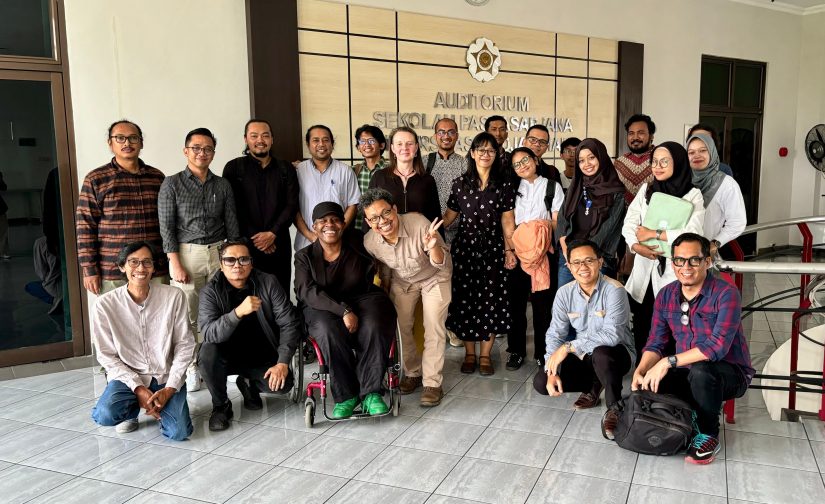
UGM Performing Arts and Visual Arts Studies Study Program in collaboration with Jogja Disability Art (Indonesia) and DaDa Fest (United Kingdom), two organizations working in the area of disability arts, held a Mini Seminar entitled Creating Meaning and Empowering Possibilities in Disability Arts Practice: A Reflection From Dada Fest (UK) and Jogja Disability Arts (Indonesia). This seminar was held on Wednesday, 8 May 2024 at 13.00-15.00 on 5th floor of the postgraduate school building UGM, guided by A. Sudjud Dartanto as moderator.
The mini seminar began with presentations from Rachel Rogers and Ngozi Ugochukwu (DaDa Fest UK) entitled Introduction to UK Disability Arts & Dada. This presentation describes the history of support and recognition of the rights of persons with disabilities in the UK which began in the 1300s and strengthened during World Wars I and II. In the mid-1980-1990s there were several activities that voiced about disability through artistic activities, political campaigns and anti-discrimination movements against disability in 1995. It was these movements that led to the founding of DaDa, which did so through the Arts Integrated Merseyside in 1984 and the North West Disability Arts Forum in 1986, which later became social models of disability. Currently DaDa is based in Liverpool and moves internationally. The DaDa movement seeks to effect social change. In art activities, DaDa also encourages activities through artist commissions, performances and exhibition opportunities and conducts training and mentoring. DaDaFest International is also routinely held as a safe space that can be used for discussion and sharing experiences, sharing messages for social justice, networking nationally and internationally.
The next opportunity was given to Triarani Utami and Nano Warsono from Jogja Disability Arts who delivered a presentation entitled Understanding The Spectrum of Meaning in Disability Arts Collaborations. They describe the history of Indonesia, which is divided into colonial, new order and reform periods and their social relevance to persons with disabilities. Then the trigger factors for discrimination that arise individually, attitudinally and environmentally. Based on this, Jogja Disability Arts was established, namely to voice the concerns of people with disabilities through artworks that are considered culturally close, easily accepted by the community and able to dismiss negative stereotypes about disabilities. There are various art programs conducted by Jogja Disability Arts such as collaboration between disabled and non-disabled artists, exhibitions, and art activities as an effort for communication and socialization.
The next speaker was Budi Irawanto from UGM Performing Arts and Visual Arts Studies Study Program who delivered a presentation entitled Disability Arts, collaboration, and Ethical Issue. This presentation explained the relationship between art and disability, the definition of Disability Arts, understanding the context of collaboration, considering the Ethics of care, various problems that arise and reflections on the activities of disability arts carried out. And the final session, namely the question session, where the moderator leads the discussion process to facilitate questions that arise from the material presented by the speaker this afternoon.
This collaboration reflects the orientation of the study program in relation to SDGs 10 and 17 on reduced inequalities and partnerships for the goals. (SHW)



